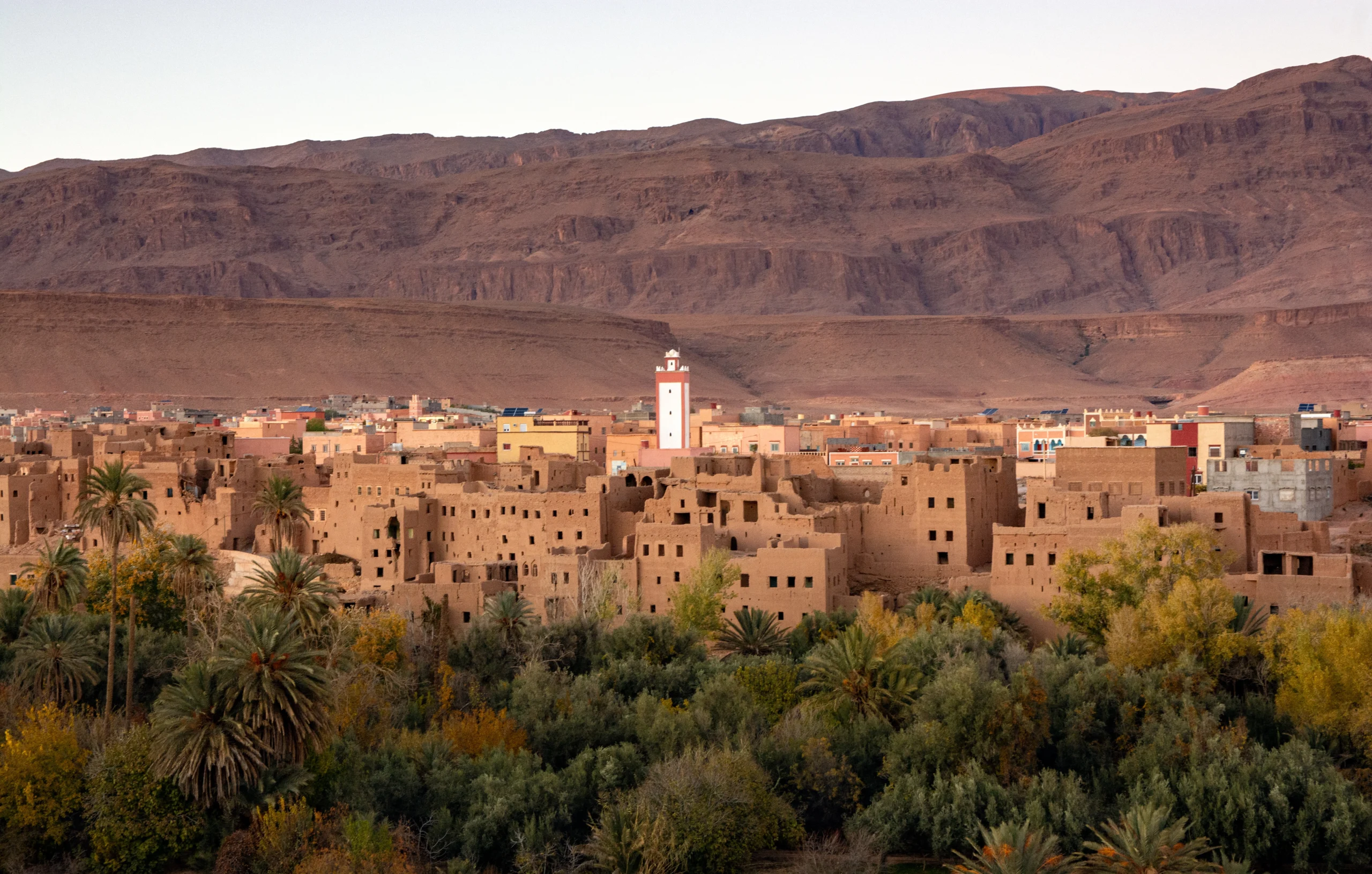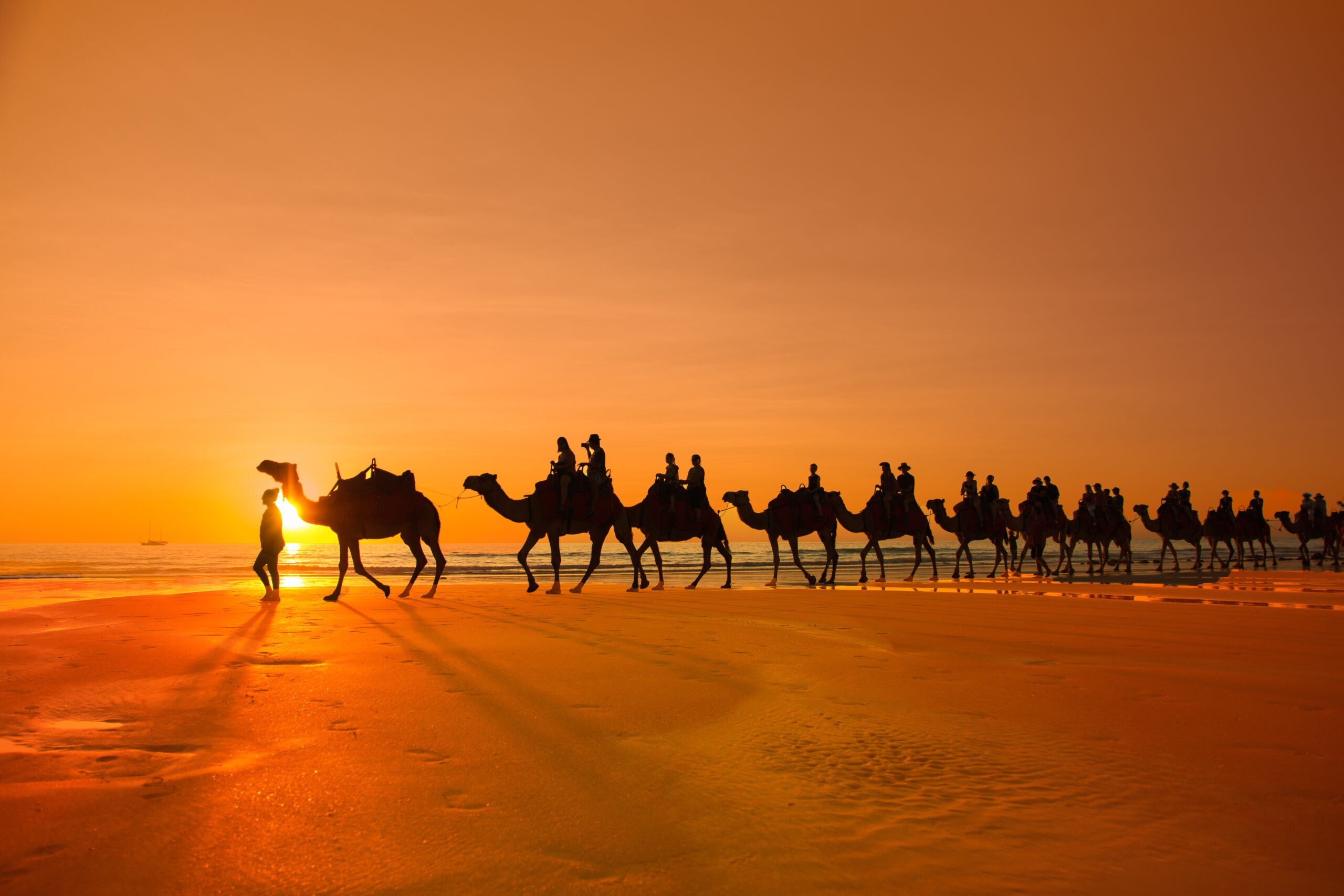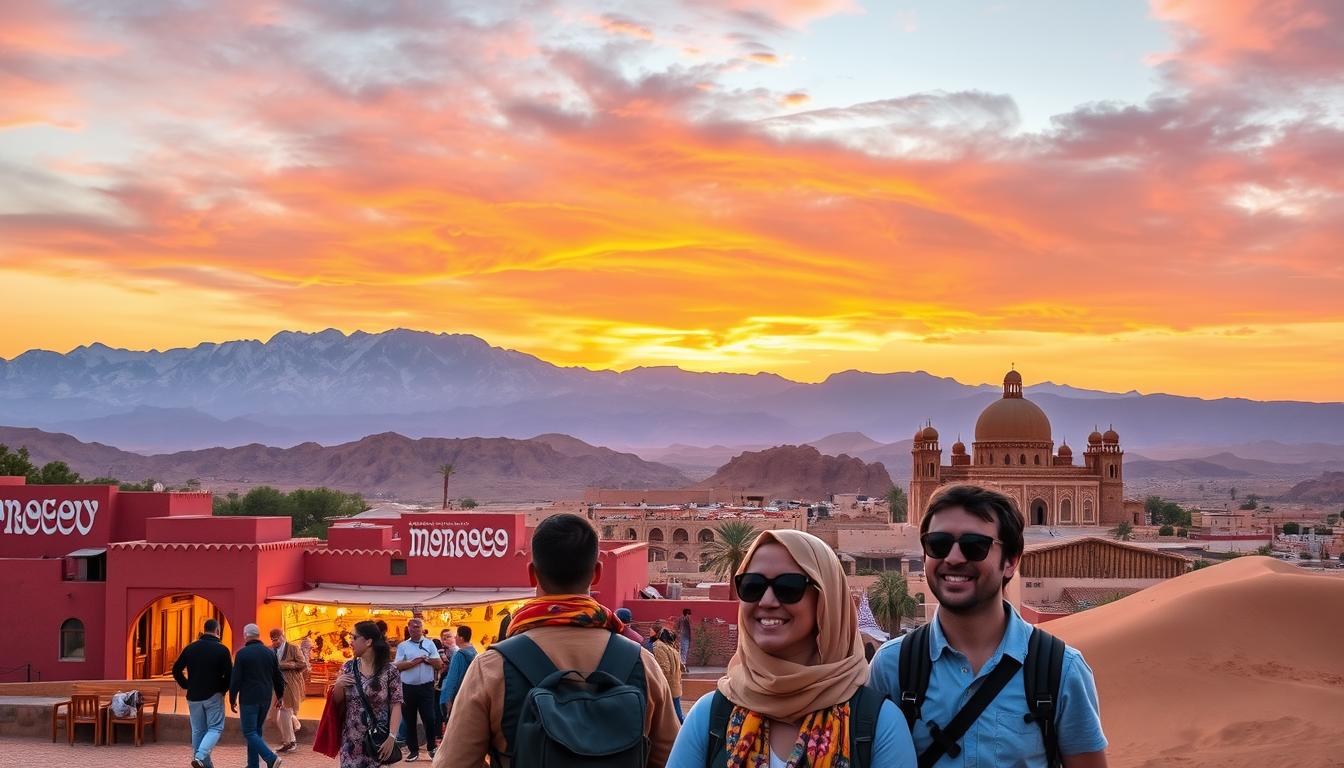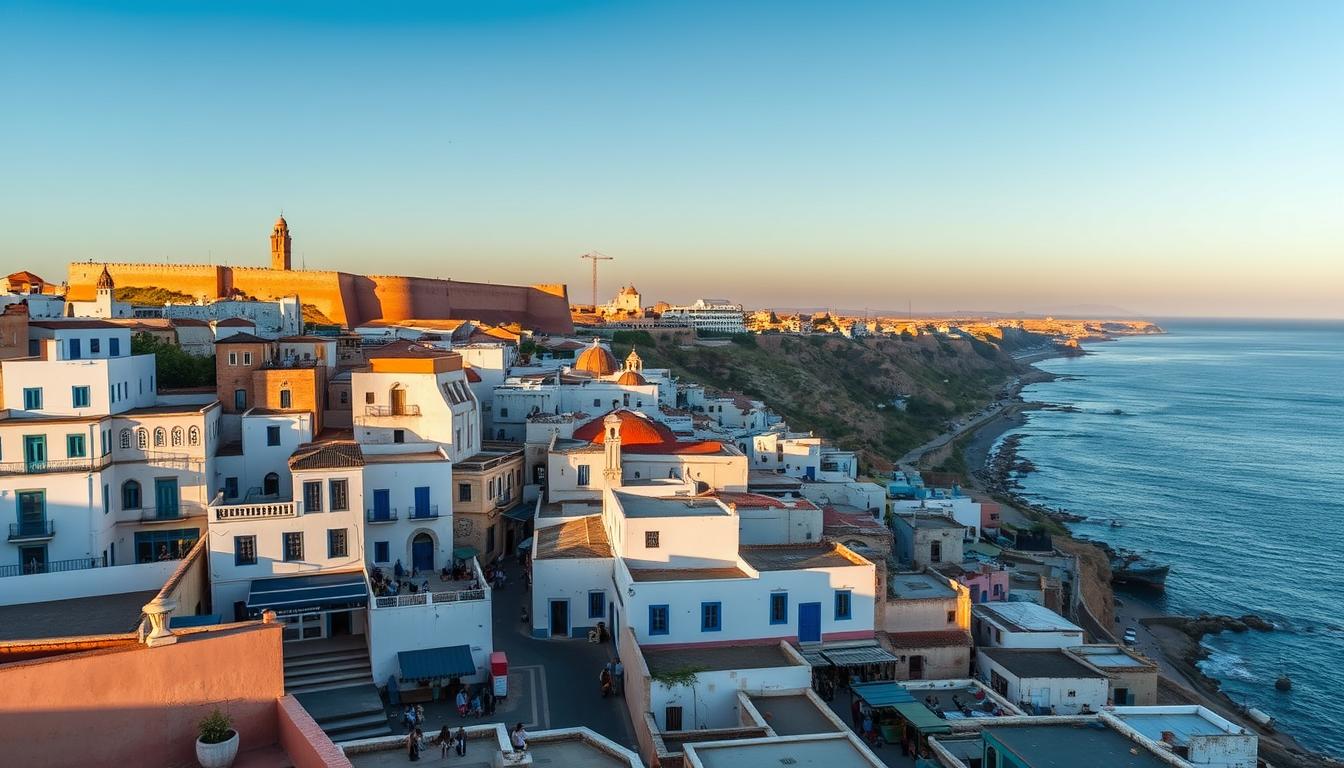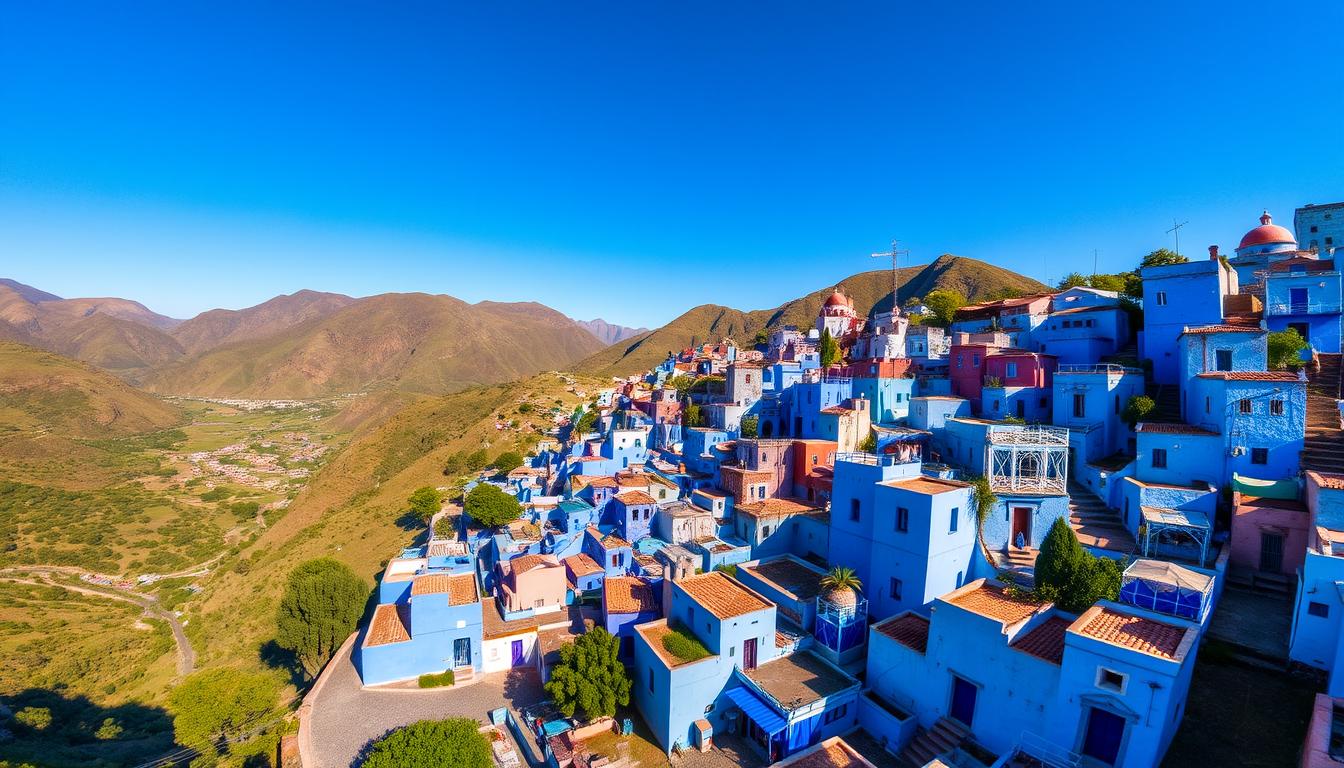Travelling through Morocco When I first walked through Marrakech’s lively streets, I knew Morocco was special. It’s a journey that changes you. Travelling through Morocco offers a mix of adventures that go beyond the usual tourist spots. You’ll find bustling medinas and the vast Sahara desert.
Your morocco travel guide is packed with tips for an amazing trip. It’s perfect for both new and experienced travelers. Morocco’s varied landscapes need careful planning and an open mind.
Traveling in Morocco is more than seeing sights. It’s about diving into a culture shaped by history. This guide will show you Morocco’s hidden gems. You’ll make memories that will stay with you forever.
Key Takeaways
- Prepare for a diverse cultural experience across multiple landscapes
- Understanding local customs enhances travel enjoyment
- Pack versatile clothing for varied climate zones
- Learn basic Arabic or French phrases
- Prioritize safety and respect local traditions
Introduction to Travelling Through Morocco
Morocco is a fascinating place that connects continents, cultures, and experiences. Your trip here will be an amazing adventure. You’ll see incredible cultural experiences and natural wonders that will amaze you.
Travelers looking for a deep dive will find Morocco diverse. You’ll see lively medinas and vast desert landscapes. Morocco offers a unique travel experience that will engage your senses.
Overview of Morocco’s Attractions – Travelling in Morocco
Morocco’s attractions offer a wide range of travel experiences:
- Ancient city landscapes with detailed architectural designs
- Vibrant marketplaces full of colors and traditional crafts
- Expansive desert terrain with stunning natural formations
- Mountain ranges with great hiking opportunities
Cultural Significance
“Morocco is not just a destination, it’s a sensory journey through history and tradition.” – Moroccan Travel Experts
Morocco’s culture is a mix of African, Arab, European, and Berber influences. This creates a unique experience. Each region has its own story, inviting travelers to explore its heritage.
| Region | Cultural Highlight | Unique Experience |
|---|---|---|
| Marrakesh | Medieval Architecture | Medina Exploration |
| Atlas Mountains | Berber Traditions | Village Homestays |
| Coastal Regions | Maritime Heritage | Seafront Festivals |
Travelling in Morocco -How to Use This Guide
This guide is here to help you explore Morocco’s rich landscape. Whether you want cultural immersion or natural adventures, each section offers practical tips. These will make your trip better.
- Read through region-specific recommendations
- Check seasonal travel tips
- Understand local customs and etiquette
- Prepare for diverse terrain and experiences
Start a journey that will give you unforgettable memories. Morocco is a country that will leave a lasting impact on you.
Travelling through Morocco -Best Times to Visit Morocco
Planning your trip to Morocco needs careful thought about the climate and cultural events. Morocco has something special all year round. Each season adds its own beauty to the cities and landscapes.
Knowing the best times to visit can make your trip unforgettable. The country’s varied landscapes mean different places are best at different times.
Seasonal Highlights -Travelling in Morocco
- Spring (March-May): Ideal for exploring moroccan cities with mild temperatures
- Summer (June-August): Perfect for coastal destinations and mountain retreats
- Autumn (September-November): Best for desert adventures and cultural experiences
- Winter (December-February): Great for skiing in the Atlas Mountains
Festivals and Events
Morocco’s cultural calendar is full of exciting celebrations. These events can make your trip even better:
| Festival | Month | Location |
|---|---|---|
| Fes Festival of World Sacred Music | June | Fes |
| Tafraoute Almond Blossom Festival | February | Anti-Atlas Mountains |
| Essaouira Gnawa Music Festival | June | Essaouira |
Climate Considerations
Travel comfort depends on knowing Morocco’s climate. Coastal areas have moderate temperatures. Inland areas have more extreme weather.
“Morocco is a land of endless discoveries, with each season showing a unique side of its rich culture.” – Moroccan Travel Experts
Pro tip: Bring layers for temperature changes. This is important when moving between different areas.
Planning Your Trip to Morocco
Getting ready for a Moroccan trip needs careful planning. Morocco tours require thoughtful preparation for a smooth and fun experience. Good planning is key to a memorable trip in this vibrant North African country.
When you start your morocco travel guides, focus on key trip preparation aspects. Each step brings you closer to an amazing Moroccan experience.
Required Travel DocumentsTravelling in Morocco
Your passport is essential for travel. Most people need:
- A passport valid for at least six months beyond your planned stay
- Blank passport pages for entry stamps
- Tourist visa (for some nationalities)
“Preparation is the secret to a stress-free travel experience.” – Experienced Traveler
Vaccinations and Health Precautions
Keeping your health safe is vital in Morocco. You should get:
- Hepatitis A and B
- Typhoid
- Routine updates like tetanus and measles
Pro tip: Talk to your healthcare provider at least 4-6 weeks before your trip for personalized advice.
Travel Insurance Travelling in Morocco
Comprehensive travel insurance is a must for morocco tours. Your insurance should cover:
- Medical emergencies
- Trip cancellation protection
- Emergency medical evacuation
By following these steps, you’ll prepare for an incredible Moroccan adventure. It will be safe and full of unforgettable experiences.
Choosing Your Transport in Morocco
Traveling through Morocco varied landscapes needs careful planning for transport. Whether you’re on a road trip or exploring by other means, knowing your options makes the journey better.
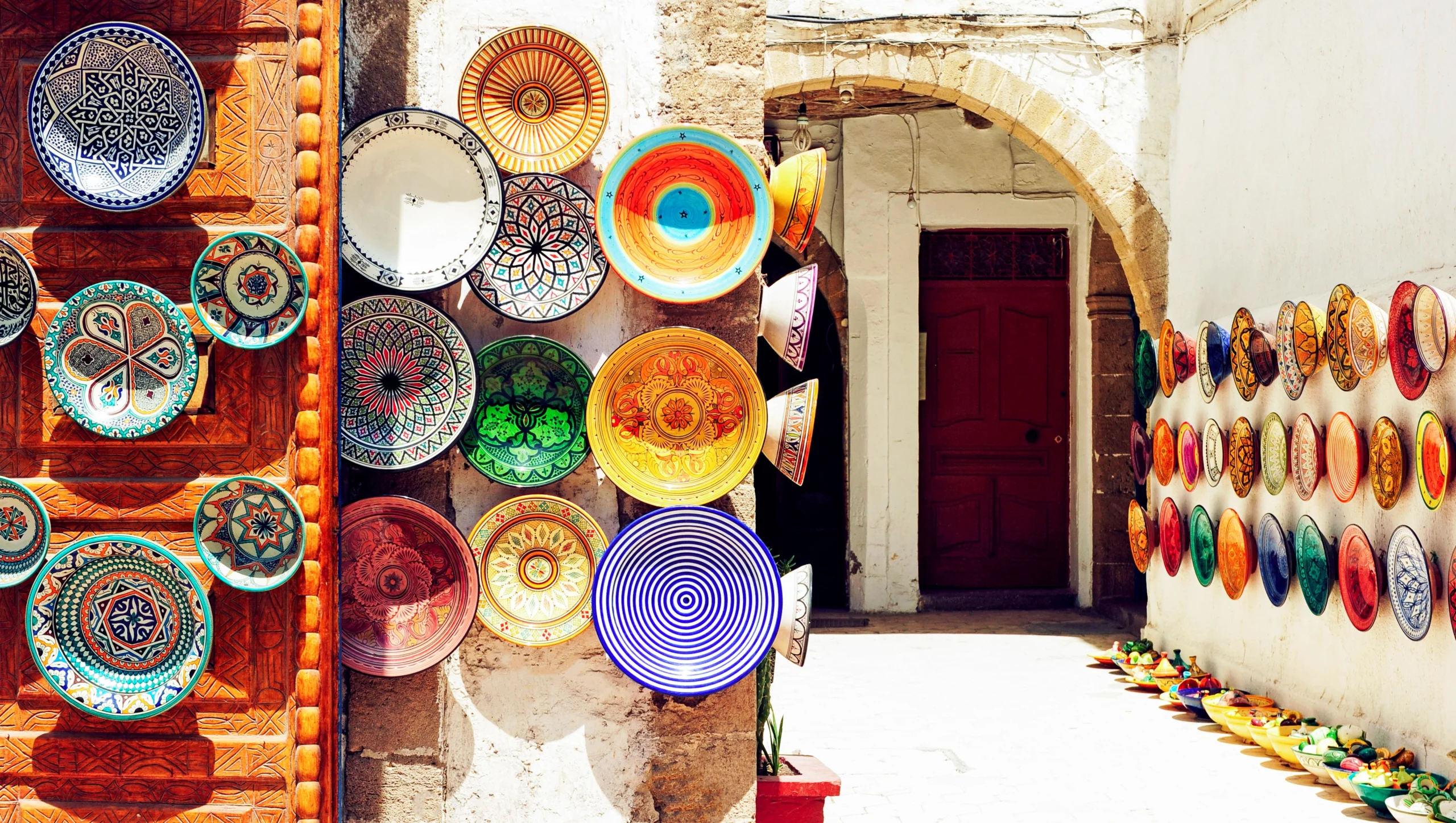
There are many ways to get around Morocco, fitting different travel styles and budgets. Your choice of transport greatly affects your trip.
Travelling through Morocco -Popular Modes of Transport
- Trains: Reliable network connecting major cities
- Buses: Affordable and extensive route coverage
- Grand Taxis: Shared intercity transportation
- Domestic Flights: Quick travel between distant regions
Tips for Local Travel
Here are some tips for getting around Morocco:
- Petit taxis work within city limits
- Grand taxis connect different cities
- Negotiate prices before starting your journey
- Learn basic Arabic or French phrases
Car Rentals and Road Conditions
For those who love road trips, renting a car is the best. Keep these points in mind:
| Consideration | Details |
|---|---|
| Driving License | International driving permit recommended |
| Road Quality | Highways excellent, rural roads can be challenging |
| Insurance | Comprehensive coverage advised |
“Prepare, be flexible, and embrace the journey.” – Moroccan Travel Wisdom
Each transport option has its own benefits. Choose wisely based on your itinerary, comfort level, and adventure spirit.
Exploring Moroccan Cities -Travelling in Morocco
Morocco’s cities are a journey through diverse and vibrant places. Each city has its own story, mixing old charm with new experiences. This shows the rich culture of Morocco.
Visiting these cities lets you explore Morocco’s past and present. You’ll see ancient medinas and modern cities. There’s a world of architecture and culture to discover.
Marrakesh: The Red City
Marrakesh is a vibrant city known as the “Red City”. Its buildings are a warm terracotta color. Visitors get to experience:
- Stunning Bahia Palace
- Bustling Jemaa el-Fnaa square
- Intricate traditional markets
Fes: The Cultural Capital 6
Fes is Morocco’s cultural heart. It shows traditional Moroccan life. The ancient medina is a UNESCO World Heritage site.
“Fes is not just a city, it’s a living museum of Morocco cultural experiences” – Travel Enthuasiast
Casablanca: The Modern Metropolis
Casablanca shows Morocco’s modern side. It mixes new buildings with old history. The city highlights:
| Attraction | Highlight |
|---|---|
| Hassan II Mosque | Architectural marvel |
| Downtown Area | French colonial influences |
Chefchaouen: The Blue Pearl
Chefchaouen is in the Rif Mountains. It’s a dream for photographers. The blue-washed streets are magical.
- Stunning blue-painted buildings
- Relaxed mountain town atmosphere
- Unique photographic opportunities
Unique Experiences in Morocco
Morocco is full of adventures that go beyond the usual tourist spots. You can explore vast deserts, rugged mountains, and beautiful coastal towns. These experiences will make unforgettable memories for you.
Exploring the desert in Morocco is a breathtaking experience. The Sahara Desert offers unique adventures that you’ll never forget.
Discovering the Sahara Desert
Traveling through the desert takes you to a world of golden sand and endless views. Camel rides are a great way to see the desert’s beauty up close.
- Overnight camping under starlit skies
- Guided camel expeditions
- Traditional Berber hospitality
Trekking in the Atlas Mountains
The Atlas Mountains are perfect for hiking lovers. You can choose from easy walks to tough multi-day treks. This shows off Morocco’s varied landscapes.
| Mountain Range | Difficulty Level | Best Season |
|---|---|---|
| High Atlas | Moderate to Challenging | Spring/Autumn |
| Middle Atlas | Easy to Moderate | Year-round |
Exploring Coastal Towns
Morocco’s coast is a nice change from the desert and mountains. Places like Essaouira and Asilah are great for relaxing after your adventures.
“The beauty of Morocco lies not just in its landscapes, but in the diversity of experiences it offers.” – Travel Explorer Magazine
Looking for adventure, culture, or a quiet place to relax? Morocco has it all. It promises journeys that will amaze you and leave lasting memories.
Moroccan Cuisine: A Culinary Adventure
Morocco’s food scene is a journey of flavors and traditions. You’ll find bustling markets and cozy cooking classes. These experiences show the rich taste and heritage of the country.
Must-Try Dishes
Don’t miss out on these iconic dishes during your visit:
- Tagine: A slow-cooked stew cooked in a clay pot
- Couscous: The national dish made of steamed semolina grains
- Pastilla: A meat pie with a sweet and savory taste, wrapped in phyllo pastry
Traditional Cooking Classes
Dive into the heart of Moroccan cooking with workshops. Learn from local chefs who share their family’s recipes.
| City | Cooking Class Experience | Duration |
|---|---|---|
| Marrakesh | Traditional Tagine Preparation | 3-4 hours |
| Fes | Moroccan Pastry Making | 2-3 hours |
| Essaouira | Seafood Cooking Techniques | 4-5 hours |
Food Markets and Street Food
Street food is the soul of Moroccan cities. Visit lively souks and markets for:
- Fresh mint tea
- Grilled meats
- Moroccan bread
- Fresh fruits and spices
“Food is our common ground, a universal experience.” – James Beard
Enjoy the local food and traditions. Taste the amazing flavors of Morocco!
Accommodations in Morocco
Traveling through Morocco offers a wide range of places to stay. These can make your trip unforgettable. Knowing your options is key to a great Moroccan adventure.
Types of Lodging Available
Morocco travel guides suggest checking out different places to stay. They fit various tastes and budgets:
- Traditional Riads (Moroccan courtyard houses)
- Luxury hotels in major cities
- Desert camps
- Budget-friendly hostels
- Guesthouses in rural areas
Recommended Hotels and Riads
Your stay can greatly improve your Moroccan trip. Here are some top picks:
| City | Recommended Accommodation | Price Range |
|---|---|---|
| Marrakesh | La Mamounia Riad | $$$ |
| Fes | Riad Fes | $$ |
| Chefchaouen | Dar Chefchaouen | $$ |
Tips for Booking
Here are some tips for booking your stay in Morocco:
- Book early during busy seasons
- Read reviews from various sources
- Make sure you know what’s included
- Know the cancellation rules
- Think about local customs
“Your accommodation is more than a place to sleep—it’s a gateway to experiencing Moroccan culture.” – Moroccan Travel Experts
Pro tip: Traditional riads offer a real taste of Moroccan life. They let you see local architecture and enjoy local hospitality.
Understanding Moroccan Culture and Customs
Exploring Morocco’s culture is more than just seeing sights. It’s about diving into the rich cultural mix that makes Morocco special. Your travel guides should teach you to respect and be sensitive to this vibrant North African place.
Morocco’s culture is a mix of Berber, Arabic, and European. This blend makes the social scene fascinating for travelers to grasp.
Key Social Etiquettes
- Greet people with Salam Alaikum (peace be with you)
- Use right hand for eating and exchanging objects
- Dress modestly, even in cities
- Remove shoes when entering homes
Important Cultural Norms
Hospitality is key in Moroccan culture. People value real connections and respect for their traditions.
“In Morocco, a guest is a gift from God” – Traditional Moroccan Proverb
| Cultural Practice | Significance |
|---|---|
| Tea Ceremony | Symbol of friendship and respect |
| Family Gatherings | Central to social life |
| Religious Observances | Deeply respected in daily life |
Language Tips
Learning Arabic or Berber phrases can make your trip better. Locals will appreciate your effort to communicate.
- Shukran – Thank you
- Afak – Please
- La – No
- Naam – Yes
By grasping these cultural tips, your trip will become more than a vacation. It will be a deep dive into Morocco’s culture, connecting you with this amazing country.
Shopping in Morocco
Moroccan cities offer a unique shopping experience. It’s more than just buying things. You’ll find vibrant markets and traditional crafts that show the country’s rich history.
Shopping in Morocco connects you with local culture and skill. The markets, or souks, are full of special items to find.
Must-Visit Markets and Souks
- Marrakesh’s Djemaa el-Fna: A sensory overload of colors, sounds, and textures
- Fes Medina: UNESCO World Heritage site with centuries-old trading traditions
- Casablanca Central Market: Modern marketplace with traditional Moroccan goods
Traditional Moroccan Handicrafts
In Moroccan cities, you’ll see amazing handmade items. They show generations of skill and tradition:
- Berber Carpets: Intricate wool rugs with symbolic designs
- Leather Goods: Hand-crafted bags, wallets, and jackets from Marrakesh tanneries
- Ceramic Pottery: Colorful tiles and decorative pieces
Bargaining Tips fo
“In Morocco, shopping is a conversation, not just a transaction.”
Bargaining is key in Morocco. Start with 40-50% of the asking price. Be ready to negotiate with respect and humor.
- Always be polite and smile
- Know the approximate value of items
- Be willing to walk away
- Enjoy the process as a cultural exchange
Safety Tips for Travelling in Morocco
Exploring Morocco is an amazing adventure. But, staying safe is key. Knowing the local safety tips helps you have a worry-free trip. Your safety depends on being informed and making smart choices.
Traveling to a new place has its challenges. Morocco travel guides suggest several ways to keep yourself and your belongings safe. This way, you can fully enjoy the vibrant culture of Morocco.
General Safety Guidelines
- Stay alert in crowded urban areas like markets and busy streets
- Keep valuable items secure and out of sight
- Dress modestly to respect local cultural norms
- Avoid walking alone at night in unfamiliar neighborhoods
Dealing with Common Scams
Tourists in Morocco might face scams. Be careful of:
- Overly friendly strangers who offer unsolicited guides
- Fake tour operators promising great experiences
- People claiming special connections or insider knowledge
Emergency Contacts
| Service | Contact Number |
|---|---|
| Police | 19 |
| Ambulance | 15 |
| Tourist Police | 0537-771-080 |
For more safety tips, check out this detailed Morocco travel safety guide. It provides detailed insights for a safe trip through Morocco.
“Preparedness is the key to a safe and enjoyable travel experience”
Navigating Moroccan Landscapes
Morocco is a treasure trove of stunning landscapes. It has vast deserts, rugged mountains, and beautiful coastlines. These places offer amazing opportunities for exploring and discovering natural wonders.
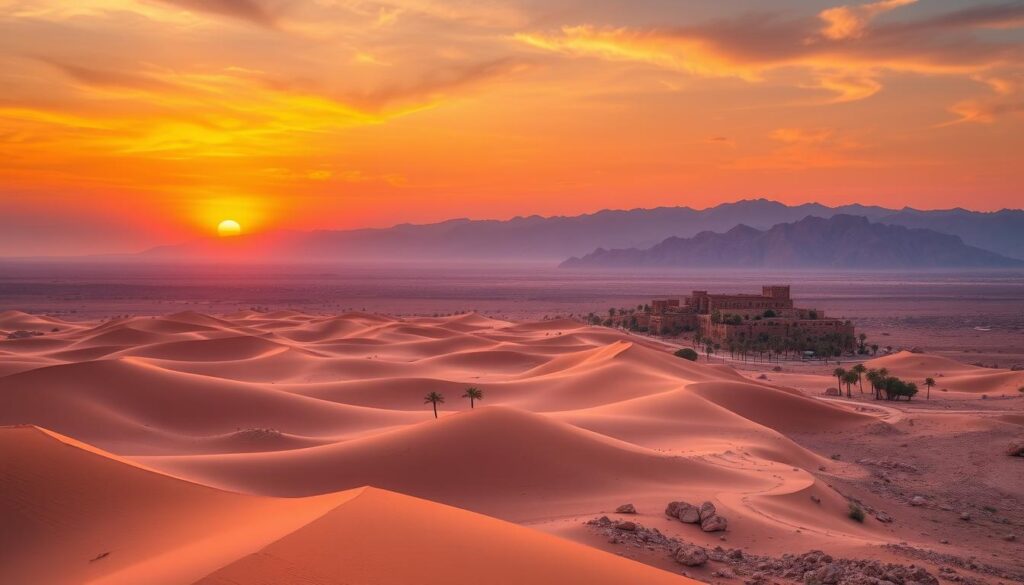
Exploring Morocco’s landscapes is a journey full of unique experiences. It challenges and inspires those who seek real adventures.
Desert Tours and Excursions
The deserts of Morocco are perfect for desert exploration. The Sahara Desert has many options for travelers:
- Camel trekking across golden sand dunes
- Overnight camping under starlit skies
- Guided tours through remote desert landscapes
Hiking Trails in the Mountains
The Atlas Mountains are a paradise for hikers. They offer trails for all skill levels. You can enjoy breathtaking views and meet local Berber communities.
| Mountain Range | Difficulty Level | Best Season |
|---|---|---|
| High Atlas | Intermediate to Advanced | Spring/Fall |
| Middle Atlas | Easy to Moderate | Summer |
Coastal Adventures
Morocco’s coast is perfect for nature lovers and water sports fans. You can surf in Taghazout or explore Mediterranean beaches. These areas show off the country’s natural beauty in a unique way.
“The landscapes of Morocco are not just destinations, they are transformative experiences that connect travelers with the earth’s most magnificent terrains.” – Moroccan Travel Experts
When you plan your adventures, make sure to pack right. Bring the right gear, hire local guides, and always be ready to explore.
Responsible Tourism in Morocco -Travelling in Morocco
Your morocco adventures can make a positive impact when you embrace responsible travel practices. Sustainable tourism is more than a trend. It’s a commitment to protecting the environment and supporting local communities during your morocco travel guides experience.
Travelers can transform their journey into meaningful experiences by following key sustainable principles. Your choices matter when exploring this beautiful North African destination.
Sustainable Travel Practices
- Minimize plastic waste by carrying a reusable water bottle
- Use eco-friendly sunscreen to protect marine environments
- Choose accommodations with green certifications
- Respect local wildlife and natural habitats
Supporting Local Communities
Engaging with local communities creates authentic morocco adventures. Consider these strategies:
- Book tours with local guides
- Purchase handicrafts directly from artisans
- Stay in family-run riads and guesthouses
- Learn basic Arabic or Berber phrases
Eco-Friendly Activities
| Activity | Sustainability Impact |
|---|---|
| Desert Conservation Tours | Supports ecological preservation |
| Community Cooking Classes | Directly benefits local families |
| Sustainable Hiking Expeditions | Minimizes environmental disruption |
“Travel can be a powerful tool for understanding and preserving cultural diversity.” – Responsible Tourism Expert
Your conscious choices can help protect Morocco’s incredible landscapes and cultural heritage while creating unforgettable travel memories.
Conclusion: Embracing Your Moroccan Adventure
Traveling through Morocco is more than just a trip. It’s a journey that changes how you see the world and wakes up your senses. You’ve seen the lively medinas of Marrakesh and the calm Sahara sands. These places show you the beauty of Moroccan culture, something you can’t capture in photos or books.
Your travels have taken you through narrow streets, over rough landscapes, and into the heart of a culture that’s hard to describe. You’ve made memories like tasting mint tea, seeing the detailed tile work, and feeling the warmth of the locals. Morocco gives you a deep travel experience that goes beyond usual tourist spots.
Reflecting on Your Travel Experience
Every moment of your trip has its own story. You’ve walked through old souks, eaten with local families, and seen the Atlas Mountains at sunset. These experiences have changed how you see the world. They’re not just pictures but windows into a rich, beautiful culture.
Encouragement for Future Visits
Morocco is a place you can’t fully explore in one trip. It’s too deep, diverse, and complex. Think of this journey as just the beginning. Morocco will keep calling you back, promising new adventures, hidden spots, and deeper connections with its amazing people and landscapes.
FAQ
Do I need a visa to travel to Morocco?
Most travelers from the United States, Canada, and European countries can enter Morocco without a visa for up to 90 days. You’ll need a valid passport with at least six months of remaining validity. Always check the current entry requirements with the Moroccan Embassy before your trip, as regulations can change.
What is the best time of year to visit Morocco?
The best times to visit are spring (March to May) and autumn (September to November). These seasons have mild and comfortable temperatures. Summer is very hot, while winter can be cool, with snow in the Atlas Mountains.
Is Morocco safe for tourists?
Morocco is generally safe for tourists. Stay aware of your surroundings and take precautions. Be careful with your belongings in crowded areas and avoid walking alone at night in unfamiliar places.
What currency is used in Morocco?
The Moroccan Dirham (MAD) is the official currency. Credit cards are accepted in major cities and tourist areas. But, it’s best to carry cash for smaller purchases and in rural areas. You can exchange currency at banks, airports, and hotels. ATMs are common in urban centers.
What languages are spoken in Morocco?
Arabic is the official language, with Berber as a national language. French is widely spoken, mainly in business and tourism. In tourist areas, many locals speak some English. Learning basic Arabic or French phrases is helpful and appreciated.
What should I pack for a trip to Morocco?
Pack lightweight, breathable clothing that covers shoulders and knees. Include a light jacket for cool evenings and comfortable walking shoes. Don’t forget sunscreen, a hat, and modest clothing for religious sites. For desert or mountain visits, pack layers and appropriate gear.
How should I handle transportation in Morocco?
Morocco offers various transportation options. Trains are comfortable and connect major cities. Buses are economical for longer journeys. Grand taxis and petit taxis are good for local travel. In cities, consider hiring a guide or using ride-sharing apps. Car rentals are available, but be prepared for different driving conditions.
What are some must-try Moroccan dishes?
Try tagine (slow-cooked stew), couscous, pastilla (savory-sweet meat pie), harira (traditional soup), and mint tea. Street food like moroccan sandwiches and sfenj (Moroccan donuts) are also worth trying.
Do I need to bargain when shopping in Morocco?
Bargaining is normal in Moroccan markets (souks). Start by making an offer of about 40% of the initial price. Be friendly and patient. If you’re not comfortable bargaining, some fixed-price shops are available in tourist areas.
What health precautions should I take before traveling to Morocco?
Consult your healthcare provider about recommended vaccinations. Routine vaccines should be up to date. Consider vaccinations for hepatitis A and typhoid. Drink bottled water, avoid ice, and be cautious with street food. Travel insurance with medical coverage is strongly recommended.

